I cannot tell a lie: I’ve not been a big proponent of The Hunger Games thus far.
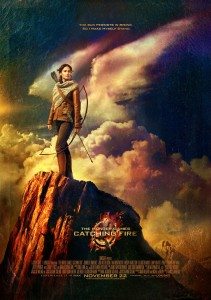 I read the books a few years back. I found them to be a poorly assembled if emotionally compelling political allegory, one that featured sub-themes of romance, fashion, and the dangers of suppressed social consciousness. Lead character Katniss Everdeen is an odd sort of heroine, sucked into a dystopian nightmare of political violence by her own disregard for the world around her. She juggles boys and bloody murder by repeatedly burying her head, albeit in a convincingly teenaged manner.
I read the books a few years back. I found them to be a poorly assembled if emotionally compelling political allegory, one that featured sub-themes of romance, fashion, and the dangers of suppressed social consciousness. Lead character Katniss Everdeen is an odd sort of heroine, sucked into a dystopian nightmare of political violence by her own disregard for the world around her. She juggles boys and bloody murder by repeatedly burying her head, albeit in a convincingly teenaged manner.
By the time the third book comes around, the questionable assumptions I had let ride in the earlier installments came home to roost—where they laid a big, unwieldy egg. The allegory overwhelmed the story, much in the same way His Dark Materials failed the promise of the first installment of that trilogy, The Golden Compass (the great book, not the terrible film).
If Collins’ books are about anything, they’re about refusing to play the world’s political games, hungry or not. Should you ignore the illogicality of their forehead-scrunching conceits, there is good substance there: about politics, about youth, about accepting responsibility, and about the dangers and rewards of being female and recalcitrant.
As much as I love Jennifer Lawrence—gorgeous, talented, modest, uncorrupted, gorgeous—the first Hunger Games film did little for me. Imagine my surprise then when the second in the series, The Hunger Games: Catching Fire kept me rapt.
I wasn’t even in a pleasant mood when I sat down to watch it, having just missed getting tickets to an earlier showing and rushing and feeling exhausted and anticipating an auditorium full of cellphone abuse. The seventeen terrible trailers that preceded the picture did no favors, either.
(Cough *Noah* Cough.)
But I honestly dug it—probably as much as the Supreme Being loathed it. So, before I get into what I liked about The Hunger Games: Catching Fire, I want to draw your attention to questions of taste.
Supreme Being and I generally agree on films, which is unfortunate as conflict is more interesting. This season we’ve disagreed on two big films, both massive Hollywood undertakings. He enjoyed Thor: The Dark World and I thought it pointless, predictable, and vapid. It’s vice-versa for The Hunger Games.
If I take a step back, it’s hard for me to delineate why I would find one of these big-budget sequels engaging and the other insipid. Both take place in implausible worlds filled with unbelievable things. As far as expectations go, I was looking forward to Thor and would have opted for sleep over The Hunger Games if my wife hadn’t been so keen.
So why did I like the second saga of Katniss Everdeen and not the transdimensional outings of the God of Thunder?
The answer lies in sympathy.
The Hunger Games: Catching Fire more-or-less carried on in tone and style from Suzanne Collins’ books and that of the first film, as directed by Gary Ross. This installment’s director, Francis Lawrence, hasn’t exactly wowed me with his previous work, although his Constantine was underrated good fun. Here, he sticks with cool blues and grays and grit to depict life in the Districts. The costumes—impressive in the first picture—get weirder in the sequel, and that’s a good thing. Action scenes and effects play satisfyingly for the most part. The acting is strong, particularly Jennifer Lawrence‘s lead performance and—of note—that of Stanley Tucci as Caesar Flickerman and Jena Malone as Johanna Mason.
If you haven’t seen the first film or read the novels, there isn’t much here to get you up to speed, but I suspect that doesn’t matter much. Right away, you’re in it with Katniss (Lawrence), her PTSD, and the mustache-twirling intrigue of President Snow (Donald Sutherland). Life still sucks fermented eggs for most everyone in Panem, only more-so.
Then: stuff happens, and at a rollicking pace and with care. Recapping the plot isn’t my interest.
What does interest me is why I engaged with Katniss and with her two unfortunate love interests—Josh Hutcherson as Peeta and Liam Hemsworth as Gale—, her mentor Haymitch (Woody Harrelson), and even with her social director Effie (Elizabeth Banks). It is because, as preposterous as the situations they traverse may be, the characters lead the story. I have sympathy for them. What they do often fails to make sense to me, but it never fails to make sense to them or to the world they inhabit.
I’m spending time with real people and they—not effects sequences—drive this story.
Surprisingly, exactly because the books are so screwy, the film manages to maintain charisma throughout. I watch it and feel like I’m hearing a new story, not an amalgamation of every other (Marvel/Disney) property, just one wearing a different costume.
That’s the main reason I liked Catching Fire. I never left the characters and they never left me. I didn’t always like them, or find them inspiring, but I believed them. I believe in screwed up, naive, deliberately difficult teenagers. I believe in self-deluding men of power. I believe in a world that is easily cottoned.
I write this, and I can see the Supreme Being awash in disbelief. I know he hated the film. Hated it. I have no doubt that he could look at it and see something as disorganized as an asteroid belt. Perhaps we’ll hear from him on the matter.
Sympathy, though, hooked me to The Hunger Games: Catching Fire. I did not, in retrospect, have a stake in how Katniss survived her ordeals, but I did have a stake in Katniss. I cared about how she fared in a way I never cared about Thor, or the Nine Realms of Existence, or even in Tom Hiddleston’s oily charismatic Loki.
And I’m sorry I feel apologetic about liking The Hunger Games because I really did like it.
Earlier I mentioned pace. That’s another thing I appreciated about this film. The Hunger Games: Catching Fire condensed a lot into its long running time. Most of these scenes both traveled at speed and felt linked, like the cars in a train. I got the information I needed for scenarios to make sense without clumsy lectures or goofy exposition (as in the first act of Thor: The Dark World).
And did I mention that Jennifer Lawrence is attractive? She is; I would think especially if you’re a young woman looking for a complex role model. One that is authentically flawed and yet persevering. She can also act. Her portrayal of Katniss Everdeen is committed. Watch her eyes at the end if you have any doubt of this. And then try to forgive the strangely tacky animation they close the film with.
If anything, The Hunger Games: Catching Fire film elevates the import of the books. What was turgid and preposterous now feels sly and suggestive.
I have no idea if they can pull off the same trick with the third book and the third and fourth films—particularly as that segment was the least tangible of the three. Part of me wants to stop here, well satisfied. Another part wants to know what happens to Katniss and Peeta and Haymitch, even though I already know.
I knew what happened here and its happening surprised me anyway.
If I knew the emoticon for a mockingjay whistle, that’s how I’d end this piece, even though I know voicing it could bring the wrath of the mighty down upon me. One must stand up for what’s right, regardless of the danger.

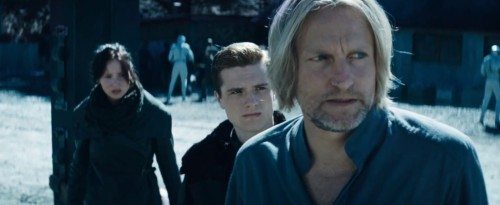
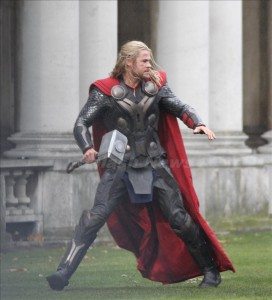
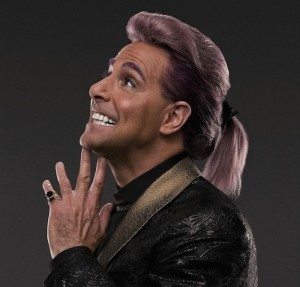
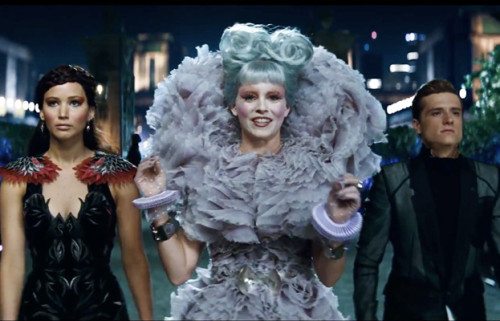

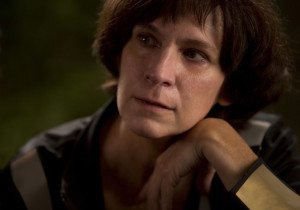

Just to be clear: I also found Thor to be pointless, predictable, and vapid. But it tried to be nothing else. And so, strangely, I was amused.
Yes…perhaps I will have something to write about Catching Fire. If not in a post, then here, sooner or later…
The first one was ok, not particularly bad but not very good either. The direction was a bit like a TV show and you could tell they had been given a fairly tight budget. Not watched this yet but my brother really enjoyed it.
The one thing they did well was casting Jennifer Lawrence, putting aside her looks she’s a good actress and has real star quality.
I think she also digs into the character in a way most actors wouldn’t for a role of this type. It is a difficult part, actually. Not so much reluctant hero as self-centered, recalcitrant loner who gets co-opted against her will.
Did end up watching this. I liked it but I thought it was good for what it is (Teen/YA Movie) rather than being a great film in general.
The thing I like about it most is the fashions of the people from the capital that whole sense of the grotesque that is going on, I love that.
i don’t think it would have made my top ten BEST films of the year, but it did make my top most INTERESTING films. i’ll have to rewatch it and see if my opinion holds.